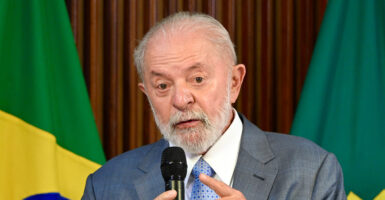The coddling of Brazil’s increasingly dictatorial president, Luiz Inacio Lula da Silva, by the Biden administration and its allies in Congress has gone from baffling to damaging to U.S. national interests.
Lula is an enemy of the United States, one itching to increase China’s presence in the hemisphere.
What gives?
“They see Bolsonaro as [Donald] Trump south of the border,” a congressional staffer told me, referring to Jair Bolsonaro, Brazil’s former president and Lula’s opponent in 2022’s election.
Bolsonaro and Trump share similar personalities and did indeed strike a close partnership while the two men led the two most populous democracies in the Americas.
But is that grounds to subvert American interests?
The latest move that let Lula’s growing authoritarian rule off the hook came this month when the House of Representatives’ Tom Lantos Human Rights Commission suddenly canceled a March 12 human rights hearing it had planned with Brazilian opposition leaders, journalists, and activists.
Rep. James McGovern, D-Mass., the co-chairman of the commission, made the unusual move of blocking the hearing.
The commission is a rarity on the Hill. It is statutorily nonpartisan and has two co-chairs, rather than one chairman from the majority, as other committees do. It’s named after the late Tom Lantos, who was a longtime member of Congress from California known for bipartisanship.
McGovern’s office pushed back against the notion that it had blocked the hearing to provide cover for Lula, protesting that it had done so because the Republicans had invited as a witness a member of the Brazilian Congress, Gustavo Gayer.
“The unusual and unprecedented thing here was to invite a sitting parliamentarian to testify,” a staffer in McGovern’s office told me. The Republicans countered that that had happened in the past.
What’s clear is that it was a missed opportunity, as a hearing would have gotten so much attention it might have slowed down Lula’s power grab. The Brazilians were clearly miffed at McGovern and came away with the impression that Lula had again reached out to his friends in Washington to prevent an examination of his record.
I’m told by a Brazilian official that he and his team are in frequent phone contact with leftist American politicians, such as Sen. Bernie Sanders, I-Vt.
The cancellation came at the last minute, after some 50 Brazilians, including members of the Brazilian Congress, had already made the trip to Washington to testify. The Heritage Foundation’s Latin American expert, Andres Martinez, was also to be a witness. (The Daily Signal is the news outlet of The Heritage Foundation.)
One of the Brazilians who was going to testify, journalist Paulo Figueiredo Filho, posted on X, formerly Twitter, on March 8: “To my surprise, we received a call yesterday saying that the hearing had been blocked by Rep. Jim McGovern and temporarily postponed. More than that: Rep. [Chris] Smith’s staff mentioned they were perplexed, as they had never seen such a pushback for a simple hearing.”
The Brazilians instead had to gather for a press conference outside the Capitol on March 12, in an area called the House Triangle, with Smith, R-N.J., the other co-chairman of the commission, who lambasted Lula’s record.
“Since late 2022, Brazilians have been subjected to human rights violations committed by Brazilian officials on a large scale,” Smith told the crowd. “Documented or credibly reported rights violations in Brazil include the political abuse of legal procedures to persecute political opposition, including jailing opposition figures on spurious charges; violations of freedom of speech and media freedom, including persecution of journalists, the silencing of opposition media, banning individuals from social media; thinly veiled censorship laws claiming to fight ‘disinformation’ and many violations of the rule of law and judicial malfeasance.”
Eduardo Bolsonaro, the son of the former president and a member of the Brazilian Congress since 2015 (who received more votes in his 2018 reelection than any other legislator in Brazilian history), had also made the trip and also spoke in the shadow of the Capitol.
“My country is in danger of turning into another Cuba or Venezuela,” Bolsonaro said, citing the hemisphere’s two worst socialist human rights abusers and economic basket cases.
“The limits of the ridiculous no longer exist,” he said, explaining how his father has come under investigation for allegedly harassing a humpback whale while jet-skiing off the coast of Sao Paulo state last June.
Like Trump, the elder Bolsonaro has been hit with a number of charges and investigations. The Lula government has taken his passport away.
Figueiredo himself has been a victim of Brazil’s new descent into darkness. One of Brazil’s best known television personalities and the grandson of a former president, Figueiredo has been deplatformed (losing 1.5 million social media followers), and the state has confiscated his passport and frozen all his assets.
The Biden administration has not just failed to condemn Lula, but has embraced him. President Joe Biden telephoned him just 45 minutes after he won 50.9% of the vote to Bolsonaro’s 49.1% in the election on Oct. 31, 2022—results that were hotly contested by Bolsonaro’s supporters.
“How did Lula da Silva repay all these good services?” asked Figueiredo at the press conference. “He has antagonized every single American interest globally, aligning Brazil with Hamas, Venezuela, Cuba, Russia, Iran, and, of course, China. Under his leadership with the BRICS (a group led by Brazil, Russia, Iran, China, and South Africa), Brazil has been actively working with China toward ending the dollar’s dominances as the international trade currency.”
The Biden administration has a well-earned reputation not just for embracing foreign leaders like Lula, but of also antagonizing other leaders who identify with traditional American values, such as Argentina’s Javier Milei, Hungary’s Viktor Orban, Israel’s Benjamin Netanyahu, and Paraguay’s Santiago Peña.
But encouraging anti-Americanism because of petty ideological concerns does not make for the best foreign policy.
Originally published by Disenso in Madrid

























